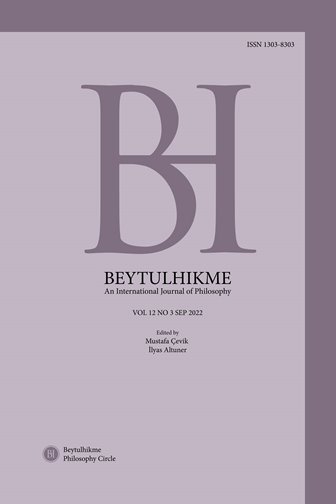Author :
Abstract
Bu makale James Joyce’un Ulysses romanında ve Derrida’nın yapıçözüm görüşlerinde edebiyat ile felsefenin iç içe geçtiği eleştirel okuma kültürünün mutlak anlam (köken) ve dil sorununa temas ettiği noktaları tartışmaktadır. Köken sorununu işleyen Babil Kulesi hikâyesi her ne kadar anlamı mutlak kökene sabitlese de Ulysses bu bağlamda okunduğunda, kökenin çokanlamlı olduğuna dair imalar içerdiği görülmektedir. Bu bakımdan Ulysses, Derrida’nın çalışmalarıyla birlikte okunarak köken eleştirisine dair yapıçözümsel bir metin olarak değerlendirilmiştir. Babil Kulesi’ndeki kökenin mevcudiyetine dair söylemin aksine, Ulysses'te Derridacı dil perspektifine benzer şekilde Batı felsefesindeki mevcudiyet metafiziğini aşan başka bir kültür ve dil deneyimine dair bağlamlar tespit edilmiştir.
Keywords
Abstract
This paper discusses the points that touch upon the problem of absolute meaning (origin) and language in James Joyce’s Ulysses, where literature and philosophy engaged, and on Derrida’s views about deconstruction together. Although the story of the Tower of Babel, which deals with the origin problem, fixes the meaning into the absolute origin, when Ulysses is read in this context, it is seen that it contains allusions to that the origin is polysemous. Therefore, reading along with Derrida’s texts, Ulysses has been evaluated as a deconstructive work on the critique of origin. Contrary to the discourse on the presence of origin in the Tower of Babel, in Ulysses, similar to the Derridarian language perspective, it has been identified that there are contexts concerning different culture and language experiences that exceed the metaphysics of presence in Western philosophy.
Keywords
- Derrida, J. (1982). White Mythology: Metaphor in the Text of Philosophy” (Çev. Alan Bass). Margins of Philosophy içinde, Chicago: University of Chicago Press, 207- 271.
- Derrida, J. (1985a). Text and Discussions With Jacques Derrida The Ear of the Other Oto- biography, Transference, Translation (Çev. Peggy Kamuf), (Ed. Christie V. McDonald). New York: Schoken Books.
- Derrida, J. (1985b). Des Tours de Babel. Difference in Translation. (Ed. Joseph F. Gra- ham). London: Cornell University Press, 167-207.
- Derrida, J. (1989). Edmund Husserl's Origin of Geometry: An Introduction. (Çev. John P. Leavey Jr.) Lincoln and London: University of Nebraska Press.
- Derrida, J. (2008). Khôra. (Çev. Didem Eryar). İstanbul: Kabalcı Yayınevi.
- Derrida, J. (2014). Gramatoloji. (Çev. İsmet Birkan). Ankara: BilgeSu Yayınları.
- Derrida, J. (2018). Edebiyat Edimleri, (Çev. Mukadder Erkan- Ali Utku). İstanbul: Ketebe Yayınları.
- Derrida, J. (2020). Yazı ve Fark. (Çev. P. Burcu Yalım). İstanbul: Metis.
- Eco, U. (2017). Avrupa Kültüründe Kusursuz Dil Arayışı Avrupa’yı Kurmak. (Çev. Ke- mal Atakay). İstanbul: Literatür Yayıncılık.
- Erkan, M. & Utku, A. (2018). Sunuş Jacques Derrida: Edebiyat Sahnesinde Tekillik Deneyimleri. Edebiyat Edimleri, (Çev. Mukadder Erkan- Ali Utku). İstanbul: Ketebe Yayınları, i-xxxii.
- Ferrer, D. (Fall 2014). Review: Joyceans on Derrida and Joyce. James Joyce Literary Supplement, 28, 2, 14-16.
- Gibson, A. (2006). James Joyce. (Çev. Orhan Düz). İstanbul: YKY.
- Gifford, D. (Spring 2002). James Joyce and Myth. Hungarian Journal of English and American Studies (HJEAS). 8, 1, 123-129.
- Joyce, J. (2017). Ulysses. (Çev. Nevzat Erkmen). İstanbul: YKY.
- Kearney, R. (2008). Zihnin Halleri. (Çev. İsmail Yılmaz). Ankara: BilgeSu Yayınları.
- Kearney, R. (2018). Yabancılar, Tanrılar ve Canavarlar Ötekiliği Yorumlamak. (Çev. Barış Özkul). İstanbul: Metis.
- Kiberd, D. (2006). Giriş. James Joyce. (Çev. Orhan Düz). İstanbul: YKY, 7-9.
- Leavey, John P. Jr. (1989). Preface: Undecidables and Old Names. Edmund Husserl's Origin of Geometry: An Introduction. (Çev. John P. Leavey Jr.) Lincoln and Lon- don: University of Nebraska Press, 1-23.
- McArthur, M. (1995). The Example of Joyce: Derrida Reading Joyce. James Joyce Quarterly. 32, 2, 227-241.
- Mitchell A. J. & Slote, S. (2013). Introduction: Derrida and Joyce: On Totality and Equivocation. Derrida and Joyce: Texts and Contexts. (Ed. Andrew J. Mitchell, Sam Slote). Albany: Unversity of New York Press, 1-16.
- Nojoumian, A. A. (2005). Tower of Babel and the ‘Genesis’ of Translation: Walter Benjamin’s and Derrida’s Reading of the Old Testament. Translation Studies. 3, 11, 9-26.
- Picq, P. (2020). Sözün Zamanı: Eklemli Dilin Ortaya Çıkışı. Dilin Kökenleri. (Ed. Jean-Louis Dessales-Pascal Picq-Bernard Victorri). (Çev. Atakan Altınörs). Ankara: BilgeSu Yayınları, 9-48.
- Richards, K. M. (2020). Yeni Bir Bakışla Derrida (Çev. Zeynep Talay). İstanbul: Ko- lektif Kitap.
- Vigsø, O. (2015). Translating Meaning. Reflections on translating Jacques Derrida’s Des tours de Babel. DOI: 10.13140/RG.2.1.4240.4562.
- Young, R. (2000). Beyaz Mitoloji Tarih Yazımı ve Batı. (Çev. Can Yıldız). İstanbul: Bağlam Yayıncılık. Öz: Bu makale James Joyce’un Ulysses romanında ve Derrida’nın yapıçözüm görüşlerinde edebiyat ile felsefenin iç içe geçtiği eleştirel okuma kültürünün mutlak anlam (köken) ve dil sorununa temas ettiği noktaları tartışmaktadır. Köken sorununu işleyen Babil Kulesi hikâyesi her ne kadar anlamı mutlak kökene sabitlese de Ulysses bu bağlamda okunduğunda, kökenin çokanlamlı olduğuna dair imalar içerdiği görülmektedir. Bu bakımdan Ulysses, Derrida’nın çalışmalarıyla birlikte okunarak köken eleştirisine dair yapıçözümsel bir metin olarak değerlendirilmiştir. Babil Kulesi’ndeki kökenin mevcudiyetine dair söylemin aksine, Ulysses'te Derridacı dil perspektifine benzer şekilde Batı felsefesindeki mevcudiyet metafiziğini aşan başka bir kültür ve dil deneyimine dair bağlamlar tespit edilmiştir. Anahtar Kelimeler: Babil Kulesi, dil, metafor, yapıçözüm, Derrida, Joyce.





